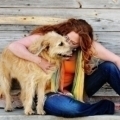Dear Denise,
What’s the best way to socialize a puppy? Our new puppy seems so intimidated by other people and dogs, but we don’t want her to be skittish as an adult. The poor little things tucks her tail between her legs when anyone but us tries to pet her. What do you think we should do to help?
Dear Mama:
 Most professionals agree that the key socialization period for dogs is somewhere between 6-12 weeks of age. This doesn’t mean that if you miss it you will have problems, it just means that this is the BEST time to help your puppy.
Most professionals agree that the key socialization period for dogs is somewhere between 6-12 weeks of age. This doesn’t mean that if you miss it you will have problems, it just means that this is the BEST time to help your puppy.
There are lots of ways you can do this, regardless of age, and I suggest you approach the situation from several angles. The first is to introduce your puppy to variety of people in a controlled and positive way. You may wish to start at home with visitors, or in the yard with your neighbors. The important part is to control the experience so that it is positive.
Using treats, encourage, but don’t force, your pup to ‘Say Hi’ (approach and a take a treat) to strangers. As the pup begins to gain confidence in this exercise, try it in different places with different types of strangers. Introduce children, men, women, beards, hats, races, etc. Any of your large retail pet stores is an excellent place to do this. Just make sure the strangers understand what you are trying to accomplish, and act gently. Also, keep these outings SHORT, maybe 10 minutes each, until your pup is relaxed and comfortable. It is important that these exercises be stress-free, and if your pup begins to show signs of stress (licking, yawning, large eyes), then it’s time to GO!
Another way to help your pup gain confidence in the wide-wild world, is using confidence course work. This is what I call ‘baby agility’ and can be accomplished in your own back yard. Teach your pup to follow your lead jumping over a broomstick, climbing over a few logs of firewood or walking a plank between two cinder blocks (make sure these things are secure). These exercises not only help your pup gain confidence in his own physical abilities, it will help him learn to trust your guidance. YOU know he can do theese things, but HE doesn’t. It’s important to make obstacles easy in the beginning, so you are always setting your pup up for success.
Lastly, if your pup is having problems with other dogs, then daycare may be in order. A good daycare (and good staff) can help your pup learn to make friends, socialize and just be a dog. This is actually pretty important, as dogs learn a lot of things from other dogs that they just don’t learn (easily) from humans. The other benefit of daycare is that a tired puppy is a good puppy!
As you work through these exercises your pup should begin to gain confidence in his ability to interact with the world. If for some reason, his natural shyness turns to fear (exhibited by snarling or growling), then you should seek professional help.
Good Luck!
 Denise Holmes is a pet behavior counselor with over 25 years of experience. She focuses on family pet training and animal-assisted therapy. She has consulted with Arkansas Children’s Hospital, helped set up a variety of local programs and produced a CD to help expecting parents introduce the family pet to a newborn, www.LoveTrustTeach.com.
Denise Holmes is a pet behavior counselor with over 25 years of experience. She focuses on family pet training and animal-assisted therapy. She has consulted with Arkansas Children’s Hospital, helped set up a variety of local programs and produced a CD to help expecting parents introduce the family pet to a newborn, www.LoveTrustTeach.com.
Photo credit: Bijoubaby via Flickr
